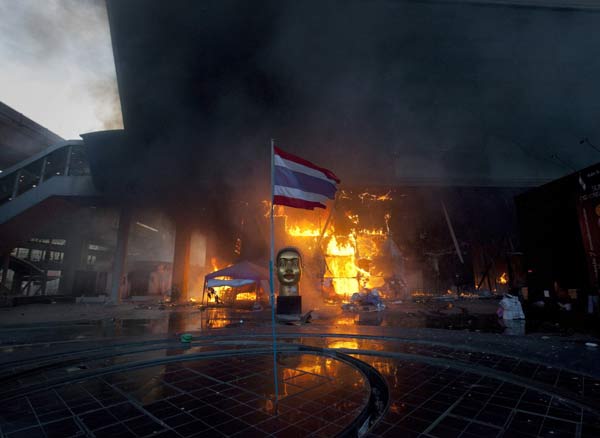Thailand's crisis not to end with rally
One day after the deadline set by the government for "red-shirts" protesters to leave rally site by 3 p.m. Tuesday, troops in the morning began to force their way to the giant stage in central Bangkok, where the protesters had called for the dissolution of lower House and a snap election.
 |
|
A statue of Buddha and a torn Thai national flag remain in front of Bangkok's Central World shopping mall, which was gutted by fire after army soldiers penetrated an encampment of anti-government "red shirt" protesters May 19, 2010. Rioting and fires swept Bangkok on Wednesday after troops stormed a protest encampment, forcing protest leaders to surrender but sparking clashes that killed at least six and triggering unrest in northern Thailand. A night curfew has been declared in Bangkok and 21 provinces. [Xinhua] |
As the "red-shirts" leaders announced in early afternoon to end the rally and turned themselves in to the police, the ensuing numerous arson cases and violence ravaging Bangkok reminded people that the political crisis in Thailand is not far from ending.
Hope of peace talks crushed
The government led by Abhisit Vejjajiva showed its best tolerance to the latest bout of anti-government rally staged on March 14, when the protesters leader boast a "million people" rally in Bangkok. From the eye-catching "blood pouring" in front of the Government House and Abhisit's residence to the occupation of Ratchaprasong, the primary business zone in Bangkok, the protesters were stretching the government's patience, which seemed amazingly flexible.
There were even times that the "red-shirts" were very close to victory, when Abhisit agreed to sit down and talk with the protest leaders in late March -- though the talks yield no results -- and when he set timetable for early House dissolution by September and snap election by Nov. 14. The "red-shirts" leaders, however, raised their demands after the initial acceptance. The timetable and a five-point reconciliation roadmap, therefore, was scraped.
Some analysts blamed the failure of the second effort of reconciliation on the different stances between "red-shirts" leaders. It seemed some radical leaders refuse to compromise while the co-leader Veera Musigapong was engaging in the negotiation.
 0
0 







Go to Forum >>0 Comments